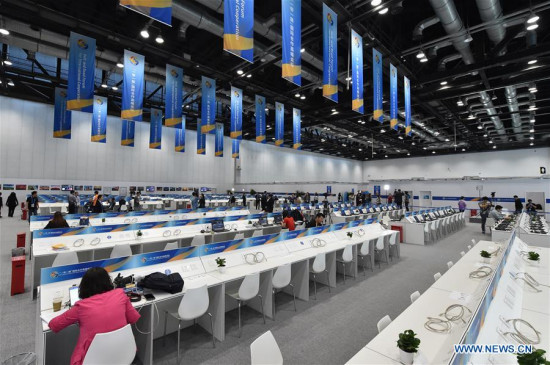
Photo taken on May 12, 2017 shows a scene of the media center of the Belt and Road Forum for International Cooperation in Beijing, capital of China. The media center was put into operation on Friday. (Xinhua/Li He)
Some Western media outlets have repeated doubts about the China-proposed Belt and Road Initiative, considering it a modern-day version of the Marshall Plan. It is quite inappropriate to draw an analogy.[Special Coverage]
Taking a close look at their respective historical contexts, purposes and principles, huge differences can be identified between the two.
The Marshall Plan for post-World War II reconstruction in Europe was part of the Western attempts to contain the expansion of the Soviet Union. The Cold War mentality and bipolar structure, however, have found no resonance with the Belt and Road Initiative.
China is by no means organizing alliances to confront any other country. It aims at achieving the common development of all countries rather than seeking spheres of political influence.
Unlike the Marshall Plan, no political conditions have been imposed on participants in the initiative. China has always advocated that countries should respect each other's rights to independently choose their own social system and development path.
China's development has benefited from the international community, and now as the world's second largest economy, the country has, in turn, made its contributions to global development.
Openness and inclusiveness are among the hallmarks of the initiative, which welcomes the participation of all countries and international organizations. The Marshall Plan, however, had excluded the Communist countries.
In terms of management pattern, while western European countries had little say in the implementation of the Marshall Plan, China is stepping up policy consultation with the partners.
Upholding the principle of extensive consultation, joint contribution and shared benefits, China works with other parties to promote greater connectivity of policy, infrastructure, trade, finance and people.
It should be noted that the Belt and Road Initiative is not to replace existing mechanisms or platforms for transnational cooperation. Much to the contrary, it builds on the existing bases to help countries align their development strategies.
Judged from a bumper early harvest, the initiative has proved to be a feasible approach for China and the parties involved to seek common development, while the old model of the Marshall Plan, which featured intentinoal investment and aid bearing political purpose, could never be applied to an era of globalization and economic interdependence.


















































